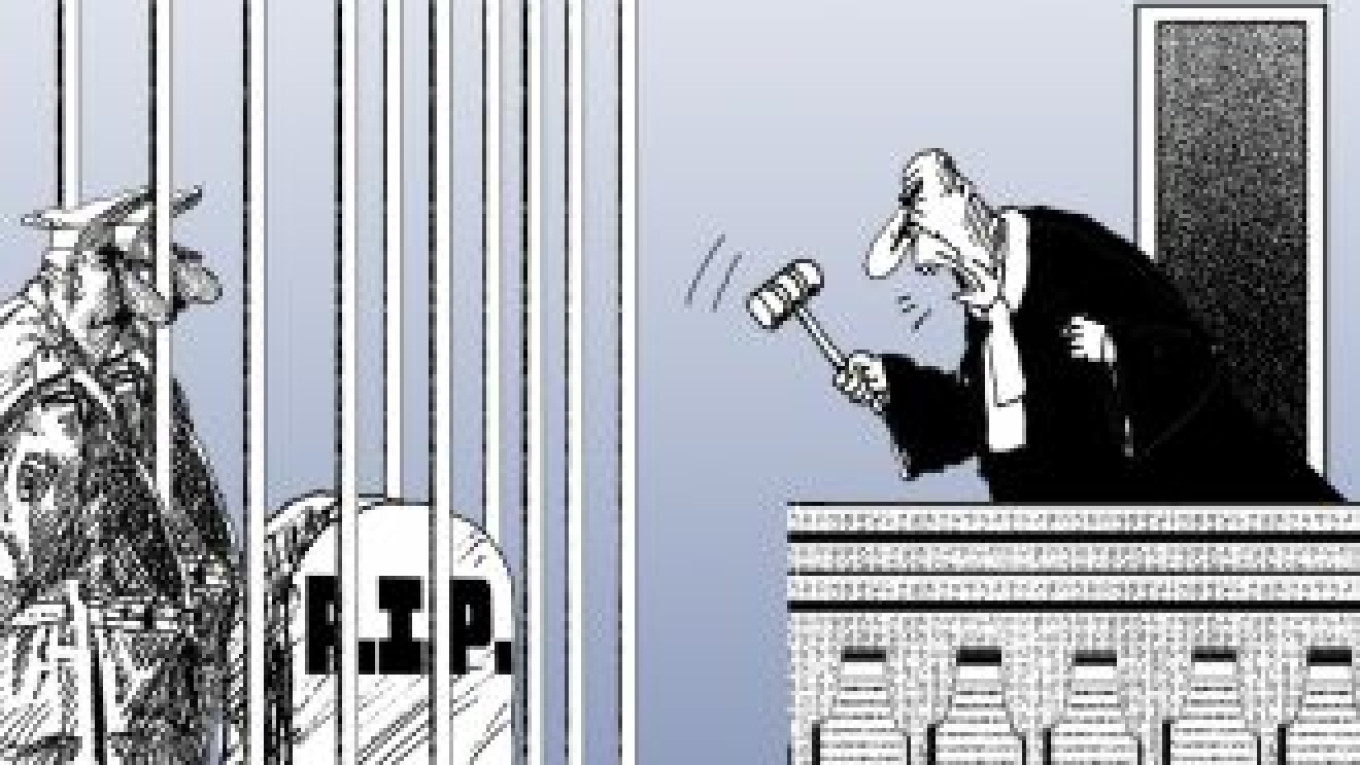At the end of November, the Prosecutor General's Office announced the upcoming trial of Sergei Magnitsky, a man who's been dead for more than three years. Putting a dead person on trial hasn't been done in Europe in more than 1,000 years. The reason is obvious: a dead person can't defend himself, no matter how absurd the charges.
The story of this latest twist in the Magnitsky case begins with his death on Nov. 16, 2009. Magnitsky's death in detention led to the automatic closing of the criminal case against him.
In July 2011, the Kremlin's human rights council published its conclusions about the arrest and death of Magnitsky. They were unequivocal:
1. Magnitsky's arrest and detention were in breach of the European Human Rights Convention.
2. Magnitsky was beaten by prison officials before his death.
3. In contravention of the law, Magnitsky was prosecuted by the same officers he earlier implicated in corruption.
4. Authorities resisted full investigation into corruption and fraud uncovered by Magnitsky.
5. The Russian courts failed to provide any legal redress to Magnitsky.
These were not conclusions Russian law enforcement officials wanted to hear. They led to an avalanche of criminal complaints, many of which were filed by Magnitsky's mother, against those who participated in the theft Magnitsky reported and in his illegal arrest and death. Therefore, in July 2011, the Prosecutor General's Office decided to legitimize the case against Magnitsky by reopening it.
Under Russian law, a case against a dead person can be continued only at the request of his family for the express purpose of attempting to rehabilitate the reputation of the deceased. Neither Magnitsky's mother nor any of his relatives have requested that this discredited case be reopened. They demanded that the case against Magnitsky be closed and that the original embezzlement scheme that Magnitsky first disclosed be reinvestigated, along with the officers who arrested and abused him. The complaints filed by the Magnitsky family relied heavily upon the conclusions of the presidential human rights council.
It is clear that the Russian government needs to justify Magnitsky's arrest. It needs to turn attention away from the fact that corrupt officials from the tax agency and Interior Ministry became wealthy after stealing $230 million from the state and also that they jailed and tortured Magnitsky in an attempt to cover up their crimes. Notably, nobody has been convicted in Russia on these charges. Meanwhile, on Friday U.S. President Barack Obama signed the Magnitsky Act, which will deny visas and freeze U.S.-based assets of Russian officials implicated in Magnitsky's death and the related embezzlement scheme.
And to add insult to injury, the government is attempting to try a dead person. Who shall speak for the dead? Boris Kibis, an Interior Ministry investigator, assigned Magnitsky's mother the status of a "legal representative of a deceased defendant," which is a legal term that has no basis in Russian law. She refused this role and asked to be removed from this illegal posthumous prosecution, only to be summoned for questioning, where it was made clear that there could be serious consequences if she didn't cooperate. When she protested, the Interior Ministry tried to replace her lawyer with one of their own.
In the end, starting in January, Magnitsky's 62-year-old mother will be forced to defend her dead son at his trial in the capacity of "legal representative of a deceased defendant."
Magnitsky's mother will not be allowed to introduce any evidence from the presidential human rights council or from any other independent investigation. If she refuses to take part in the cruel mockery and humiliation of being forced to participate in a show trial of her dead son, she could be prosecuted.
This is the real face of President Vladimir Putin's "dictatorship of law." Get used to it. It is a sign of things to come.
Jamison Firestone is an attorney and Sergei Magnitsky's former boss.
Related articles:
A Message from The Moscow Times:
Dear readers,
We are facing unprecedented challenges. Russia's Prosecutor General's Office has designated The Moscow Times as an "undesirable" organization, criminalizing our work and putting our staff at risk of prosecution. This follows our earlier unjust labeling as a "foreign agent."
These actions are direct attempts to silence independent journalism in Russia. The authorities claim our work "discredits the decisions of the Russian leadership." We see things differently: we strive to provide accurate, unbiased reporting on Russia.
We, the journalists of The Moscow Times, refuse to be silenced. But to continue our work, we need your help.
Your support, no matter how small, makes a world of difference. If you can, please support us monthly starting from just $2. It's quick to set up, and every contribution makes a significant impact.
By supporting The Moscow Times, you're defending open, independent journalism in the face of repression. Thank you for standing with us.
Remind me later.


